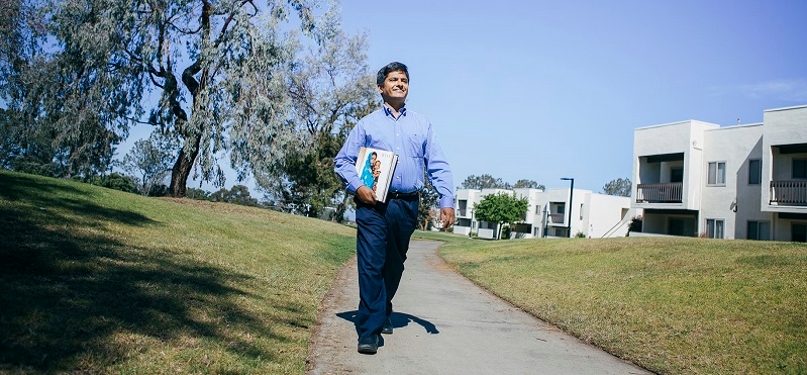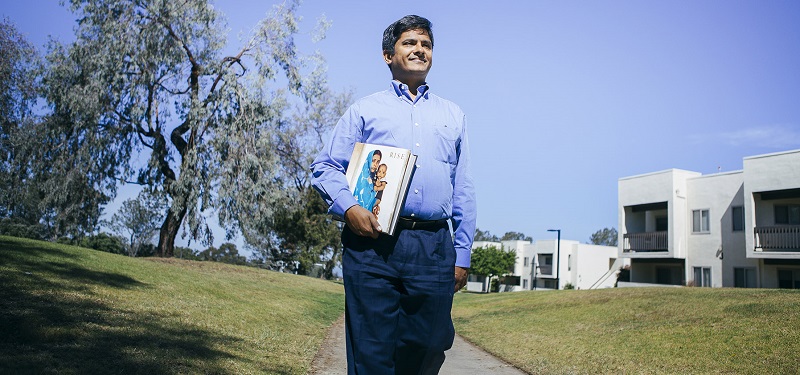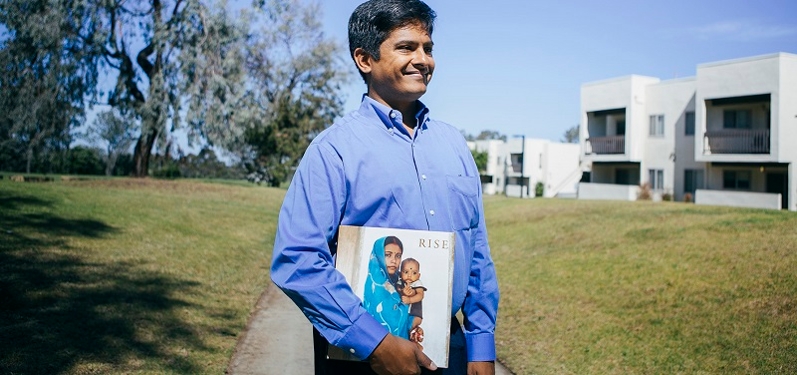Walking the Talk
Taking on inequity at the crossroads of ‘rigor, relevance and impact’
By Inga Kiderra
He talks a million miles a minute. At his office desk, he prefers a treadmill to a chair. But what really drives Karthik Muralidharan is getting out in the field – running experiments and testing policies to improve the lives of people in developing economies like India’s. “The best economist,” he says, quoting a recent Financial Times headline, “is one with dirty shoes.”
Muralidharan joined UC San Diego’s Department of Economics in 2008, after earning his Ph.D. at Harvard University. An affiliate of several prominent research organizations, he recently accepted an invitation to serve as an honorary advisor to the National Institution for Transforming India, an initiative of the Indian federal government. He will be working with the secretaries of education in the Indian states.
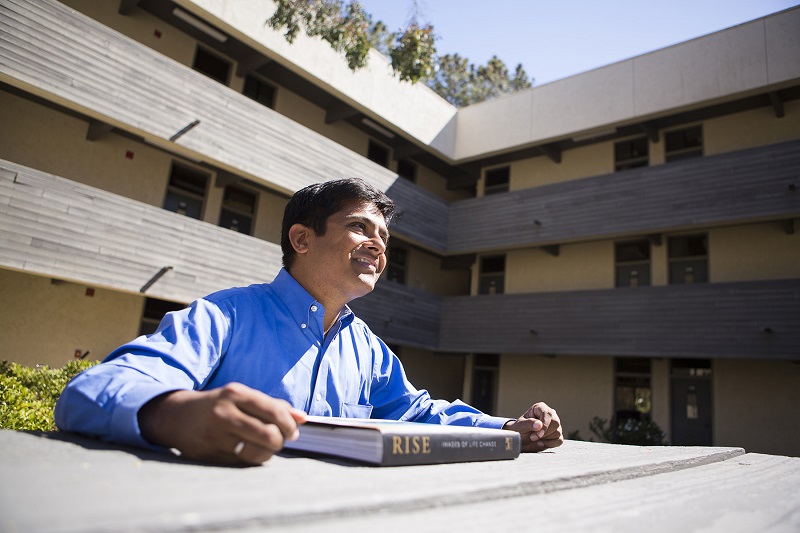 “My calling is as an academic and researcher,” Muralidharan said, “but I think it would be irresponsible to not also help in translating evidence into better policy. There’s so much to be done.”
“My calling is as an academic and researcher,” Muralidharan said, “but I think it would be irresponsible to not also help in translating evidence into better policy. There’s so much to be done.”
As a young boy in Ahmedabad, in Western India, he noticed inequity. “There’s no way to hide from the contrasts between the haves and have-nots,” Muralidharan said. Yet he didn’t begin thinking about it on a systems level, he said, until he got a scholarship to study abroad. Arriving in Singapore age 16, he marveled at how that country had gone from poverty to prosperity in the space of a couple of decades. It was then that he “recognized the power of good economic policy to be transformative” and began to shift from pursuing a career path in engineering to economics.
Now, when Muralidharan teaches courses on development economics at UC San Diego, he often opens with a quote from Nobel Prize-winning economist Robert Lucas. Lucas says and Muralidharan echoes, once you begin to think about the problems of development and the consequences for human welfare, “it is hard to think about anything else.”
Improving education
Muralidharan specializes in evaluating outcomes in education and other social sectors. As summarized in an India Today cover story on “The Leaders of Tomorrow,” he works “at the intersection of development, public and labor economics.” His most influential studies to date concern India’s education system.
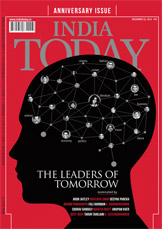 By several estimates, that system is not performing well. India has succeeded in getting the vast majority of its children to school; enrollment is nearly universal now. But they may not be learning all that much. According to the most recent Annual Status of Education Report, only 48 percent of students in fifth grade can read a second-grade text. Put another way, more than half are three levels behind.
By several estimates, that system is not performing well. India has succeeded in getting the vast majority of its children to school; enrollment is nearly universal now. But they may not be learning all that much. According to the most recent Annual Status of Education Report, only 48 percent of students in fifth grade can read a second-grade text. Put another way, more than half are three levels behind.
India has invested in its school facilities and infrastructure, “but none of the business-as-usual spending seems to work,” Muralidharan said. “What matters is school governance and improvements in pedagogy. We need to shift from focusing on inputs to focusing on learning outcomes.”
Because developing countries have very tight budgets, Muralidharan said, “it is essential for policies to be informed by cost-effectiveness. There are enormous inefficiencies in the way public funds are spent, and pivoting spending away from less effective to more effective policies can sharply improve learning outcomes even without increasing spending.” He cites one study as an example: He found in a randomized controlled trial that doubling teachers’ salaries had zero impact on children’s learning outcomes. On the other hand, linking just an average 3 percent of that salary to outcomes made a huge difference.
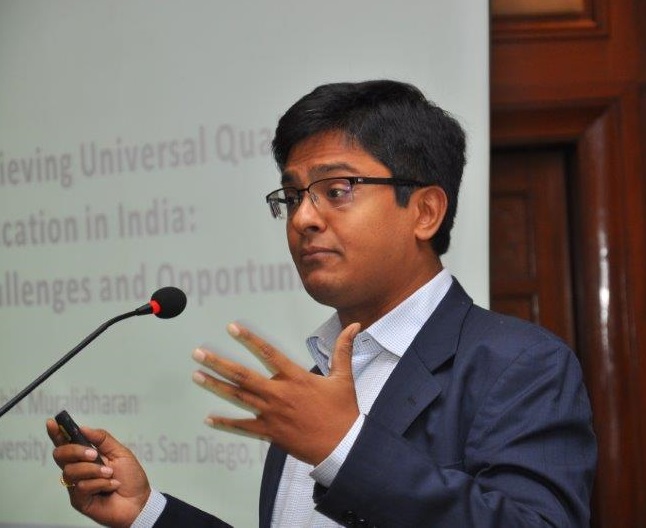 Muralidharan recently synthesized a decade of research on primary education policy in a background paper for the Indian government’s 12th Five-Year Plan. Many of his recommendations were incorporated into the final document, and in his new advisory role with the government, he is helping implement some of these ideas.
Muralidharan recently synthesized a decade of research on primary education policy in a background paper for the Indian government’s 12th Five-Year Plan. Many of his recommendations were incorporated into the final document, and in his new advisory role with the government, he is helping implement some of these ideas.
Recently, the Research on Improving Systems of Education (RISE) initiative of the United Kingdom’s Department for International Development, announced that it would begin work in India. Muralidharan is principal investigator on a six-year, $5 million RISE project that, in his words, “aims to provide scientifically rigorous evaluations of reforms at a scale relevant for policymakers.”
Muralidharan’s education research has ranged from exploring teacher pay and school choice to evaluating whether providing bicycles to adolescent girls improves their chances of staying in secondary school. He is now also growing his research program to include experiments with the use of technology in education. “Technology by itself does not solve anything,” he said. “But we are starting to see evidence that personalized learning [made possible by technology] – can have mind-blowing results.”
Improving anti-poverty programs
Also delivering results is another combination of technology and evidence-based policy: using smart cards, or chip cards, that have been biometrically authenticated (with a fingerprint, say), to distribute social welfare payments directly to recipients.
Muralidharan, together with fellow UC San Diego economist Paul Niehaus and Sandip Sukhtankar of the University of Virginia, worked with the Indian state of Andhra Pradesh to evaluate the state’s use of smart cards to distribute pensions, as well as employment payments through the nation’s “right to work” law. By reaching a landmark agreement with the government to randomize the order in which the smart-card program was rolled out over two years, the researchers created treatment and control groups they could compare. The study covered 19 million people and is one of the largest randomized controlled trials ever done.
The results appear in the October 2016 issue of the American Economic Review. Implementing the program was not without its challenges, but all in all, the use of smart cards reduced corruption and leakage, with more money reaching its intended recipients. It broadened access to program benefits and did so cost-effectively. People liked it better, too, overwhelmingly preferring it to the old pen-and-paper system that sometimes fell prey to unsavory clerks. Muralidharan and Niehaus presented on this work as keynote speakers at the 2015 Delhi Economics Conclave, which featured some of India’s most senior policymakers, including the prime minister and finance minister of India.
This work has also earned them support from the Bill and Melinda Gates Foundation for a new project: a $5 million grant to work with the government of India to improve the design and delivery of anti-poverty programs. The project is being hosted primarily at J-Pal South Asia, at the Institute for Financial Management and Research, with UC San Diego’s PDEL, or Policy Design and Evaluation Lab, serving as a subgrantee. Muralidharan and Niehaus will collaborate with central and state governments in India to design policy reforms for various subsidy programs, focused especially on food, fuel and fertilizer. Critically, they will also evaluate the impact of rolling out these reforms.
Ground truths
It used to be that economic theory was way ahead of empirics, Muralidharan said, but he got his PhD just as the field was undergoing a shift, with access to more data and a growing respect for applied work. “It’s an amazing time to be doing economics – at the confluence of rigor, relevance and impact,” Muralidharan said. “We are privileged to be in a position to do both academically cutting-edge research and to work on alleviating problems that directly affect the lives of hundreds of millions of people in the poorest parts of the world.”
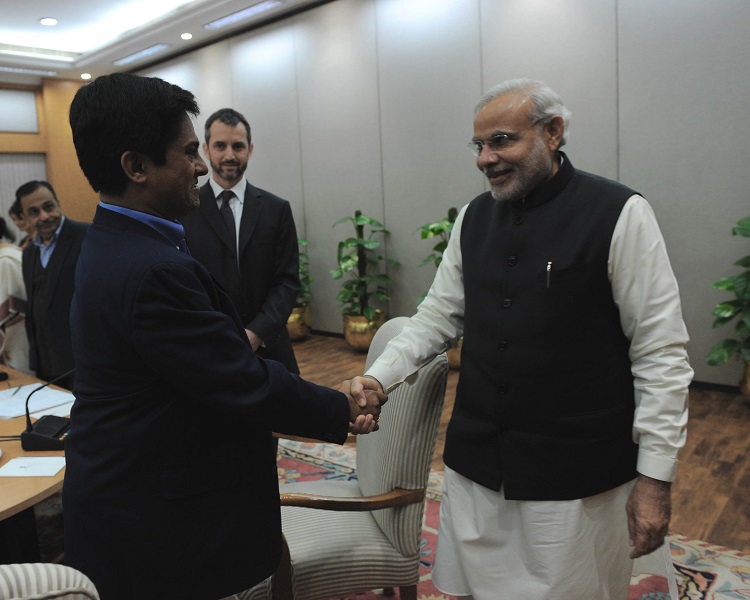 After a recent meeting in India’s capital, with senior officials in the Indian prime minister’s office, Muralidharan spent the next day on a research visit to rural Tamil Nadu, a state in the country’s south. He ate lemon rice with the teachers at an early childhood center and, to test questionnaires, sat with the children on the floor. It was grounding, he said, a good reminder of why he does what he does: “It’s to help kids in the developing world achieve their full potential.” The goal of development, he says, is not just to grow GDP but to promote human development – especially health and education. Borrowing from Indian economist and philosopher Amartya Sen, he adds: “It is about enabling people to lead meaningful lives of their own choosing.”
After a recent meeting in India’s capital, with senior officials in the Indian prime minister’s office, Muralidharan spent the next day on a research visit to rural Tamil Nadu, a state in the country’s south. He ate lemon rice with the teachers at an early childhood center and, to test questionnaires, sat with the children on the floor. It was grounding, he said, a good reminder of why he does what he does: “It’s to help kids in the developing world achieve their full potential.” The goal of development, he says, is not just to grow GDP but to promote human development – especially health and education. Borrowing from Indian economist and philosopher Amartya Sen, he adds: “It is about enabling people to lead meaningful lives of their own choosing.”
Learn more:
- Karthik Muralidharan’s website
- Muralidharan op-ed in the Indian Express on rewarding states for improving social-sector outcomes, “Ask for Results“
- Podcast where Muralidharan describes developing country education systems
- On-camera conversation with the chief economic advisor to the government of India on “Charting a Course for the Indian Economy“
‘Reducing inequity is the highest human achievement’
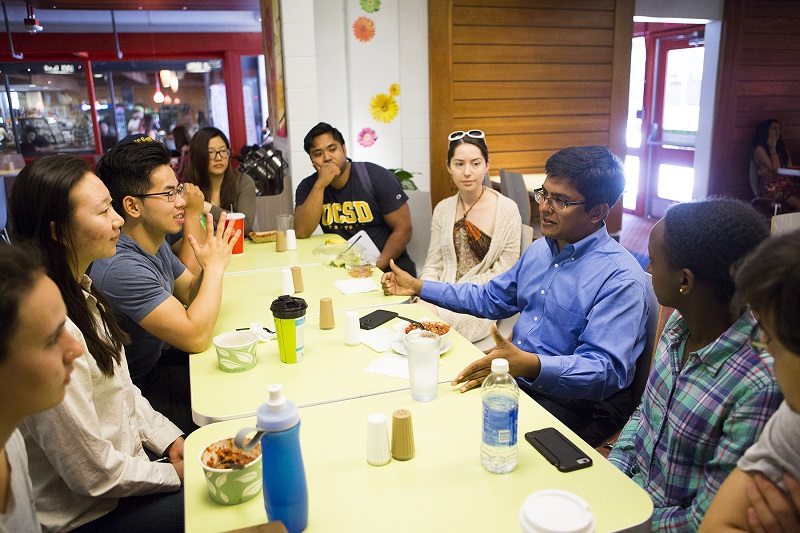 When Bill Gates delivered the 2007 commencement address at Harvard, UC San Diego development economist Karthik Muralidharan was in the audience, graduating with his doctorate. Muralidharan, who recently won support from the Gates Foundation to work on improving the design and delivery of anti-poverty programs, still finds that speech particularly poignant:
When Bill Gates delivered the 2007 commencement address at Harvard, UC San Diego development economist Karthik Muralidharan was in the audience, graduating with his doctorate. Muralidharan, who recently won support from the Gates Foundation to work on improving the design and delivery of anti-poverty programs, still finds that speech particularly poignant:
“[H]umanity’s greatest advances are not in its discoveries – but in how those discoveries are applied to reduce inequity. Whether through democracy, strong public education, quality health care, or broad economic opportunity – reducing inequity is the highest human achievement.”
Muralidharan likes to share Gates’ remarks with his students at UC San Diego. Even more importantly, he shares with them his own passion. Students benefit not only from his rigorous research but also from his high-level work with policymakers and his shoes-on-the-ground experience.

